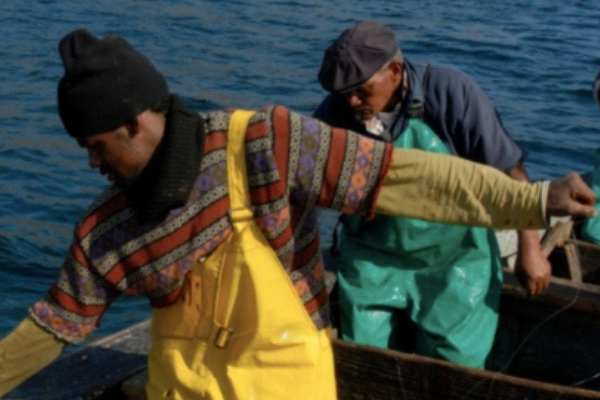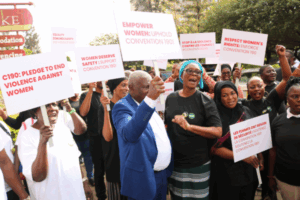The Covid-19 pandemic actually just further illustrates how insignificant and how severely neglected we, as small-scale fishers, are as a legitimate fisheries resource user-group.” — Charles America, veteran fisher and activist from Ocean View, Cape Town.
Charles situates his discontentment in the failed policies and lack of policy implementation in the privatisation of fishing rights through an Individual Transferable Quota (ITQ) system that commodifies the fishing right. The ITQ system is primarily concerned with promoting economic efficiency rather than conservation, community welfare or equity. The ITQ system seeks to broaden resource-access and to transform and reform the fisheries. It is a case where politics and economics determine the future of the small-scale fisheries (SSF). This happens through the de-concentration of the number of new rights-holders that enter this sector. It is also where economics results in the concentration of the new entrants into the large fishing companies. The big fishing companies are vertically and horizontally integrated, and the space for small-scale fisheries to develop is very limited to non-existent.
Many fishers like Charles who eke out an existence of small-scale fisheries are still waiting for restitution, the security of tenure, and for justice to prevail in the fishing sector. In reality, small-scale fishing rights are allocated in the Northern Cape, Eastern Cape and Kwa-Zulu Natal while many in the Western Cape are still operating on interim relief permits—these are not real rights—and lock fishers in exploitative agreements with Fish Processing Entities. The reliance of some small-scale fishers on lenders and marketers for financial assistance has created a cycle of indebtedness. In most instances, the borrowed money is for buying food and related household necessities. The payments of these high-interest debts often come from the social grant that is intended for other purposes. In some instances, the costs associated with fishing are covered from a portion of the social grant.
Charles has witnessed the long-drawn process of correcting the injustice that is yet to be concluded. The long-overdue ‘interim dispensation’ still accommodates the individuals that were or are aggrieved by the legislated exclusion prior to 2014. The exclusion had far-reaching implications on the livelihoods of the fishers, the sense of measured cooperation, and the community spirit. Food insecurity, unemployment, lack of access to fisheries resources, Draconian law enforcement, conservation prioritised over human rights to food and dignity, lack of alternative forms of employment, and associated social problems define communities that once thrived through fishing.
Charles, like many small-scale fishers have been through many cycles of hope, despair, desperation and hopelessness. In most fishing settlements along the Western Cape, the months of January and February are as dreadful as the winter months due to limited food supplies or complete lack of income in fishing households. The difficulties begin in December, where social pressure dictates in some communities to spend as part of the festive season. The revenue would have come from payments relating to the West Coast rock lobster (WCRL) season. During this time, WCRL is the sole reliable source of higher income. They trade the species through a chain of middle-men to China where supply can not quench the demand. Nearly all of South Africa’s WCRL goes to the Chinese market. The Chinese New Year often results in higher revenue to role players higher up in the supply chain, while the small-scale fishers generate meagre income from their high-risk fishing activity. Despite this unfair distribution of benefits, the fishers on the ground do get some short-term income to cover household expenses.
Charles felt the economic impact of the coronavirus outbreak well before the virus was declared a global pandemic by the World Health Organisation, or the lockdown by the South African government. The changes in China resulted in reduced volumes of imported food products, travel restrictions and bans, no celebrations (weddings, funerals and Chinese New Year) or visits to public places to contain the spread of the deadly virus. The knock-on effect drastically impacted on the price of rock lobster. When China announced an immediate and comprehensive ban on the imports of live animals, the writing was on the wall for WCRL local suppliers. The traded rock lobsters fall under the category of live animals, which implied that some of the 90% of rock lobster traded with China came to a halt. The immediate negative impact was on the income of fishers and the oversupply of lobster in the local market. A similar observation was on the abalone market. The Marine Stewardship Council also froze the exports from South Africa.
The interim agreement was the extension of the fishing season for the near-shore fishery from March to June, and the offshore and Northern Cape fisheries from June until September. It is not clear how this will be of much help to the fishers who often plan on their income in advance. Also, with an extended lockdown period or ban on traded commodities like seafood, how will it help the SSF and moneylenders hooked into supplying the fish stock to markets. It is worth mentioning that most small-scale fishers have already used their deposit or advance payments.
Charles highlights the current challenges on how to respond to the Covid-19 lockdown regulations and limitations:
“Food production, legal entities, community systems, and state fisheries management seem to be equally hamstrung by the Covid-19 pandemic because it (the Department of Environment Fisheries and Forestry) had absolutely no idea nor contingency plan in place or in mind. So, the problems and tasks of local traditional fisherfolk are so much more daunting and burdensome. We now need to illustrate (articulate and describe), as accurately as possible, the compromised situation in which we as traditional artisanal fisher peoples find ourselves due to the added complications facing us.
“This is largely because of the total lack of knowledge or understanding of the traditional fishery (“SSF/IR” fishers), their way of life and their fishing and food production. Similarly, important is their social makeup and the importance of community in which certain unwritten and inherent customs form a vital part of the bigger community whose primary source of affordable animal-based protein comes from our traditional artisanal fishers (bona fide full-time fishery-reliant fisher artisans).”
Support small-scale fisheries
Clarify who falls under the small-scale fisheries group —interim relief, small-scale fishers, near-shore fishers, and line fishers. What about fishers who use the recreational permits (known as post office permits) to catch snoek? What can be done to secure their food security and livelihoods?
Lift the bag limits for SSF on all sustainably harvested species like snoek, yellowtail, Cape bream and use the available catch per unit effort (CPUE)—meaning the SSF should be allowed to catch maximally for the day to provide nutritious food protein to coastal communities.
Ban all commercial trawlers (offshore and inshore) targeting snoek and other key small-scale line fish species before small-scale fishers can access it and only allow small-scale fishers to catch it with the line (one line one fish). These species are in a healthy state and play an essential food security role in poor coastal communities, for farm workers, etc.
The implications of not being able to transport and sell fish at their strategic sites or spots have livelihood and nutrition security implications. Without an income, fishers may not be able to continue with fishing activities because they are not covered under any form of an incentive scheme. Allow SSF to sell the fish to their communities or in a traditional way—bakkie trade. The ban is problematic and taking nutritious food from the community. Instead of SSF selling fish to the fishing companies, we call on fishing companies to redirect their cold-chain to support small-scale fishers to sell their fish to centrally-placed market locations together with small-scale producers.
Giving local small-scale fishers an opportunity to supply fish to government facilities could serve a very important purpose in strengthening their livelihoods. Small-scale fishers can also supply the shelters that are in the province.
Encourage small-scale fishers to smoke, salt (dry and wet) fish especially snoek to extend the shelf life and provide nutrient-rich protein to poor communities during lockdown.
Repurposing the oversupply of fish as food
There is an oversupply of nutrient-rich fish protein off the boats in the Northern Cape with the start of the snoek run, in cold storage, in holding tanks of many big fishing companies due to the Covid-19 ban on export trade since January 2020.The fishing industry could redirect the fish to millions of poor South Africans during the Covid-19 lockdown and beyond.
Consuming nutritious protein is needed in the time of Covid-19 because it is vital for the general health of communities. A call on the fishing industry to repurpose their operations to provide fish as food to communities.
Instead of selling fish caught by the small-scale fishers, especially snoek, to fishing companies, we urge them to repurpose their operations to support small fisheries operations and community markets.
The informal fish trade must continue with the necessary protective gear and sanitation requirements to sell to their communities. With proper cold storage and sanitation requirements, the sale of snoek on the back of bakkies should fall under the same permit regulations like fruit and vegetable informal traders.
The state should provide personal protective gear and sanitisers.
Implement a Covid-19 basic income grant (social grants, child grants, school feeding schemes, community soup kitchens)
Our results suggest that more households in fishing settlements are now more dependent on the state for a stable and reliable form of income. Small-scale fishing often supplements the grants that come from the government. In some families, there are more than one beneficiary that gets the grant. However, due to high food prices in shops that are accessible in rural communities, the grants do not cover a significant portion of the household needs.
When families can hardly generate an income, school-going children have their schools to count on for at least two meals per weekday. The grim reality faces all the children when schools have to close for the quarterly holidays. The meals that are provided through the National School Nutrition Programme have significant importance to needy families.
The uncertainty of the lockdown’s duration also means uncertainty of school-going children returning to consistent weekly meals. In some schools, they observed an all-time high school attendance driven by the school feeding programme. Accounts are made that some schools go to the extent of delivering food parcels for sick kids that cannot go to school. This gesture enables the child to recover without worrying about missing a meal at school. While schools are supposed to resume already, for many children the meals cannot resume due to lockdown.
In most small-scale fishing settlements, soup kitchens were already struggling to cater for the needy members of the society. The small bag limits imposed by the Fisheries Department also meant that fishers could no longer share fish with soup kitchens. The tradition had been that after splitting fish among the crew, there would be some fish taken to either a needy family or a soup kitchen. In most instances, the soup kitchens cater for, among others, the elderly community members and fishers that can no longer fish on their own.
This article is republished with the permission of Institute for Poverty Land and Agrarian Studies (PLAAS). See the original article on PLAAS website.
Photo credit: Main image: Konstantin Steinbichler







